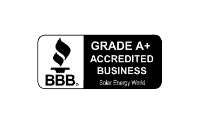Solar panels stand at the forefront of eco-friendly home energy solutions, converting sunlight into electricity to power everything from your HVAC system to your electronic devices. This guide explores how solar panels for homes work, highlighting their numerous benefits, addressing potential challenges, and providing practical advice for homeowners considering the switch.
By adopting solar energy, you’re not just lighting up your home—you’re taking a giant leap towards sustainability and significantly reducing your carbon footprint. Whether you’re new to solar energy or ready to make the transition, this blog will serve as your comprehensive resource, demystifying solar panels for houses and empowering you to make an informed decision.
How Do Solar Panels Work on Houses?
Solar panels convert sunlight into electricity and hot water through photovoltaic (PV) systems. Sunlight’s particles, known as photons, are absorbed by the panels, creating electrical charges within PV cells. This process transforms sunlight directly into direct current (DC) electricity. A connected inverter then converts the DC power into alternating current (AC), the type of electricity used in homes. In solar water heating applications, the panels heat a transfer liquid that warms up a water tank, providing hot water. By harnessing the sun’s energy, solar panels provide an efficient and sustainable solution for residential electricity and hot water needs.
For homeowners, integrating solar panels means that during sunny periods, the electricity generated can power the house directly, reducing reliance on the grid and lowering electricity bills. Any excess energy produced can be fed back into the grid or stored in home batteries for later use, ensuring a steady power supply even during cloudy days or nighttime. Additionally, many regions offer incentives or rebates for solar panel installations, making it an economically attractive option. With advances in technology, solar panels have become more efficient and aesthetically pleasing, easily integrating with different roofing styles. Investing in solar panels not only contributes to a sustainable future but also enhances the value of the property, showcasing a commitment to renewable energy.
Benefits of Solar Panels
Solar panels present a plethora of advantages for homeowners, making them a wise investment for a sustainable future. Benefits include:
- Eco-Friendly Energy Production: Solar panels are a beacon of green energy, generating electricity without relying on fossil fuels. By converting sunlight directly into power, they provide a clean and renewable energy source, contributing to the reduction of harmful emissions and mitigating the effects of climate change.
- Reduction of Greenhouse Gas Emissions: The adoption of solar panels plays a crucial role in diminishing the volume of greenhouse gasses released into the atmosphere. Unlike conventional power sources that depend on burning coal or natural gas, solar panels produce electricity with zero emissions, helping to create a cleaner, healthier environment.
- Ubiquitous Energy Source: The sun’s rays are a vast and untapped reservoir of energy, bathing the Earth in abundant light even on cloudy days. Solar panels can capture and convert this sunlight into electricity, ensuring a reliable energy source is available across various geographical locations, promoting energy independence and resilience.
- Enhancement of Property Value: Homes equipped with solar panel systems are increasingly sought after in today’s real estate market. Potential buyers are willing to pay a premium for properties that offer energy-efficient solutions, recognizing the long-term savings and environmental benefits. The installation of solar panels can significantly boost your home’s market value, making it a smart investment for the future.
- Significant Cost Savings: One of the most immediate and tangible benefits of solar panels is the substantial reduction in energy bills. By generating your own electricity, you become less reliant on the grid and more in control of your energy consumption, leading to noticeable savings over time. Additionally, various government incentives and rebates for solar panel installations can further enhance the financial viability of making the switch to solar.
The adoption of solar panels transcends beyond just the environmental benefits; it is a sound financial investment, a progressive step towards energy independence, and a meaningful contribution to a cleaner, more sustainable world. Homeowners who choose to integrate solar panels into their energy solutions are not just saving on costs but are also playing a vital role in the global movement towards renewable energy, laying the groundwork for a greener future.

Receive a No-Cost, Customized Solar Estimate for Your Home
Why May Solar Panels Not Work?
In some situations, solar panels may not work as efficiently because they do not receive enough direct sunlight– though that’s not the case in most areas.
Can Your Roof Support a Solar Panel System?
When considering the transition to solar energy, assessing the readiness and suitability of your roof is a critical step. Ensuring that your roof can support a solar panel system is paramount for both the efficiency of the system and the safety of your home. Below, we delve into the considerations and evaluations necessary to make this determination:
- Structural Integrity: The foundational requirement for installing solar panels is a roof in sound structural condition. A professional inspection can ascertain whether your roof is strong enough to support the weight of the solar panels, ensuring that the installation won’t compromise the integrity of your home.
- Roof Material and Design: Different roofing materials and designs have varied capacities to accommodate solar panels. For example, composite shingle roofs are generally more conducive to solar panel installations than tile roofs. Consulting with a solar installation professional can help determine if any modifications or special mounting equipment are required for your specific roof type.
- Roof Age and Condition: The lifespan of a solar panel system can extend up to 25 years or more. If your roof is nearing the end of its life or requires significant repairs, it may be more cost-effective to address these issues before proceeding with the solar panel installation.
- Available Space and Orientation: The size and shape of your roof, as well as its orientation towards the sun, play crucial roles in determining how many solar panels can be installed and how efficiently they will operate. A south-facing roof with ample, unobstructed space is ideal for maximizing energy production.
- Potential for Upgrades or Reinforcements: If your roof isn’t immediately ready to support a solar panel system, it doesn’t mean solar is off the table. Structural reinforcements or upgrades can be made to ensure your roof is capable of bearing the load and maximizing the efficiency of your solar investment.
- Permitting and Regulations: Before proceeding with installation, it’s essential to understand the local building codes and obtain the necessary permits. Professional solar installers can help navigate these requirements, ensuring that your solar panel system is up to code and compliant with all regulations.
By thoroughly evaluating the condition, material, and structure of your roof, as well as addressing any necessary repairs or modifications, you can confidently embark on your solar energy journey, ensuring a safe and efficient integration of solar panels into your home’s energy system.
Even with this comprehensive understanding, determining your roof’s capacity for solar panels can be challenging. Don’t hesitate to reach out—our team of solar experts is on standby, ready to assist you in making the right decision for your home!
Get the Solar Panel System You Need Today
When it comes to solar panels and homes, the best way to find out how well it could work for you is to give us a call. Ask us, “Can my home have solar panels?” We will provide you with information on the installation process and help you to get a quote to learn about the cost of solar panels. Contact us today to get started:




















